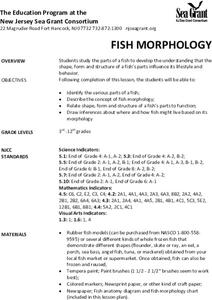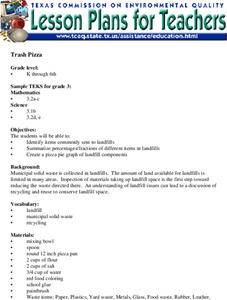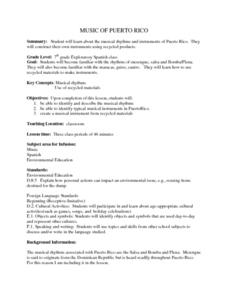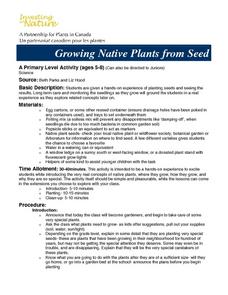Curated OER
Ocean/Beach Center
Students examine different types of ocean life. They classify sea shells and role play in the ocean center. They color and write about their experience in the ocean center and share their experiences with their classmates.
Curated OER
Earth Day Trash Survey Unit
Students participate in local Earth Day activities. They keep track of the types of trash they pick up. They aggregate their data to develop whole-class statistics of what they found.
Curated OER
What's the Weather Where You Are?
Students create a weather map while traveling across the country on the train. They study the names of the states, letter recognition and the vocabulary of weather terms.
Curated OER
Up in the Sky
First graders associate events and objects with day or night. They create a word bank and use is as a reference to create sentences about the sun. They conduct sun-themed experiments and art projects.
Curated OER
Problems in Pollutia
Fifth graders, in groups, pretend as if they live in the imaginary kingdom called Pollutia. They make recommendations about environmental issues and give short speechs on how each problem should be solved.
Curated OER
The Three E's - Exciting Energetic Electrons
Students perform flame tests on salts and record the electron configurations for various cations. They analyze and record the results using spectroscopes.
Curated OER
You Gotta Have A Hat
First graders compare versions of the folktale, 'Caps for Sale.' After listening to both stories, 1st graders utilize a Venn Diagram imbedded in this lesson to produce a graphic organizer detailing the similarities and differences...
Curated OER
Fish Morphology
Students identify the various parts of a fish. They describe the concept of fish morphology and relate shape, form and structure of a fish's parts to function.
Curated OER
How Can We Conserve Water?
Young scholars describe the importance of water conservation and list ways to conserve. They construct composts and fill them with materials that recycle nutrients. They inspect their homes for leaky pipes, toilets, and faucets.
Curated OER
The Recycle Games
Students play a series of Recycle Games which provide great exercise while teaching about the importance of recycling. They participate in relay races and games that make use of recycled materials and other "trash."
Curated OER
What a Waste
Students analyze components of garbage. They collect and sort a few days' worth of garbage. They chart the results of an investigation.
Curated OER
Trash Pizza
Students work together to identify items sent to landfills. They summarize percentages of the different items found in landfills. They create a pizza pie graph of all of the components found in landfills.
Curated OER
Meteorology (Condensation)
Second graders define condensation and evaporation. They identify and describe the steps in the water cycle. They ask questions to end the lesson.
Curated OER
Hydroponics
Young scholars discuss the concept of hydroponics. They create and run their own hydroponics system. They record and analyze the data they collect.
Curated OER
What Can We Do About Trash in Our Community?
Fourth graders examine how to deal with the amount of trash in their community. They discover alternate ways of managing waste. They develop their own solutions to the problem.
Curated OER
Earth Day - Bursting Beans
Students fill jars with dried beans and water, cover the jars, and wait to see what happens in this excellent Science experiment ideal for Earth Day (April 22nd). Emphasis is placed on discovering the reactions of seeds to water.
Curated OER
Introduction to Waste Management
Students research the difference between hazardous waste and municipal solid waste. Different companies in their community are researched to determine which are contributing waste in their region, what type of waste is generated, the...
Curated OER
Life Cycles
Using computers, Students work in small groups and progress through the roles of Explorer, Researcher, Designer, and Evaluator as they study the life cycle of plants, insects, butterflies and frogs.
Curated OER
Music of Puerto Rico
Seventh graders study about the musical rhythms and instruments of Puerto Rico. Then they construct their own instruments using recycled products. Students listen to different genres of music and define them. Students focus on the...
Curated OER
A Fishy Twist on Adaptations
Students examine the relationship between specific fish adaptations and their function for survival. They design a fish based on certain adaptations and then decide to which habitat their fish would be best suited. Individual students...
Curated OER
How Long Does Trash Last
Students work in cooperative groups to estimate how long trash lasts in a landfill. They study environmental consequences of not recycling and use graph-making software to create a graph that illustrates the lifespan of trash items...
Curated OER
M is Magical
Students recognize the phoneme /m/. Through listening and matching activities, students discriminate the phoneme /m/ from other letters and phonemes. They associate /m/ with its letter representation and identify the phoneme in various...
Curated OER
Growing Native Plants From Seed
Second graders plant seeds of native plants. They study the concepts of native plants, where they grow, how they grow, and why they are so special. They assess long term care monitoring the seedlings as they grow and write the name...
Other popular searches
- Reduce Reuse and Recycle
- Reduce Reuse Recycle
- Reduce Reuse Recycle Lesson
- Reduce Reuse Recycle Poems
- Reuse Trash Graphing
- Reuse Recycle
- Reduce, Reuse, Recycle
- Recycle, Reuse
- Recycle, Reuse, Reduce
- Reuse Clay
- Adaptive Reuse
- Recycling:reduce, Reuse

























